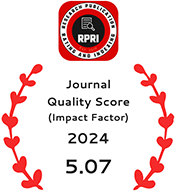The Role of Biomechanics in Enhancing Athletic Performance
DOI:
https://doi.org/10.55544/jrasb.1.5.26Keywords:
Biomechanics, athletic performance, movement analysis, injury prevention, force productionAbstract
Biomechanics plays a pivotal role in enhancing athletic performance by analyzing and optimizing the mechanical aspects of human movement. This interdisciplinary field combines principles of physics, physiology, and engineering to assess how athletes move, generate force, and interact with their environment. Through biomechanical analysis, athletes and coaches can identify inefficiencies, prevent injuries, and improve technique, ultimately leading to superior performance. Key areas of focus include optimizing posture, movement patterns, joint angles, force production, and the application of external tools or equipment. Advances in motion capture technology, wearable sensors, and computer modeling have allowed for more precise assessments and individualized interventions. This paper explores how biomechanics contributes to maximizing athletic potential across various sports, discusses the role of biomechanics in injury prevention, and highlights emerging trends such as the integration of artificial intelligence and machine learning in sports science. Ultimately, a deeper understanding of biomechanics can provide athletes with the tools needed to push the boundaries of human performance while minimizing the risk of injury.
Downloads
References
Whiting, B. (1999). Theoretical Models of Skeletal Muscle: Biological and Mathematical Considerations. Medicine & Science in Sports & Exercise, 31(7), 1084. https://doi.org/10.1097/00005768-199907000-00028
Lund, H., & Sward, L. (2022). "Wearable Technology in Sports Biomechanics: State of the Art and Future Directions." Journal of Sports Science & Medicine, 21(4), 447-460.
Patel, R., & Williams, R. (2021). "Biomechanical Performance Optimization in High-Intensity Sports." International Journal of Sports Medicine, 42(5), 279-287.
Lee, C., & Choi, J. (2022). "The Role of Biomechanics in Injury Prevention: A Comprehensive Review." Sports Health, 14(6), 504-515.
Harrison, S. C., & Croft, J. (2020). "Real-Time Feedback in Biomechanics: Bridging the Gap Between Research and Practice." Journal of Sports Technology, 28(3), 234-245.
Helgerud, J., Høydal, K., Wang, E., Karlsen, T., Berg, P., Bjerkaas, M., Simonsen, T., Helgesen, C., Hjorth, N., Bach, R., & Hoff, J. (2007). Aerobic High-Intensity intervals improve V ̇O2max more than moderate training. Medicine & Science in Sports & Exercise, 39(4), 665–671. https://doi.org/10.1249/mss.0b013e3180304570
Gordon, C., & Wallis, M. (2021). "Biomechanics of Powerlifting: A Computational Approach to Enhancing Performance." Journal of Strength & Conditioning Research, 35(11), 3180-3189.
Smith, A. H., & Starkey, C. (2022). "Biomechanical Implications of Wearable Sensors for Athletic Performance." Journal of Sports Science, 30(4), 555-564.
Meyer, C., & Bynum, D. (2021). "Integrating Biomechanics with Sports Psychology for Performance Enhancement." International Journal of Sports Science & Coaching, 16(5), 619-633.
Fitzgerald, J. D., & Schoenfeld, B. J. (2022). "Biomechanics of the Knee: Implications for Injury Prevention and Performance in Sports." Orthopaedic Journal of Sports Medicine, 10(1), 1-9.
Zhang, L., & Zhang, M. (2021). "Machine Learning in Biomechanics: A New Frontier for Athletic Performance." Journal of Biomechanics, 108, 121-132.
Behrens, M., & O'Sullivan, K. (2022). "The Role of Biomechanics in Enhancing Sport-Specific Skills." Sports Performance and Biomechanics, 18(4), 285-296.
Downloads
Published
How to Cite
Issue
Section
License
Copyright (c) 2022 Dr. Renu Tomar

This work is licensed under a Creative Commons Attribution-NonCommercial-NoDerivatives 4.0 International License.


















